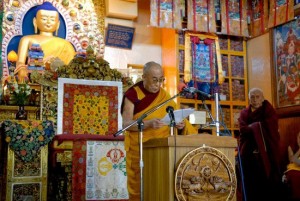The Office of His Holiness the Dalai Lama issued a statement today reiterating that the issue of Tibet concerns the future of six million Tibetans in Tibet and not the Dalai Lama.

The Dalai Lama delivers a statement at a prayer ceremony in Dharamsala, India on April 5, 2008.
Dong Yunhu’s statement followed the 7th round of dialogue between the Dalai Lama’s envoys and Chinese officials, a meeting that was characterized by the Tibetans as disappointing.
The statement by the Office of the Dalai Lama also reiterated the Dalai Lama’s position that once the Tibetan people in exile are able to return to Tibet with meaningful autonomy, he will not play any role in the future government of Tibet, let alone seek the Dalai Lama?s traditional political position in the government. The statement is enclosed in full below.
His Holiness the Dalai Lama and the Tibet issue
Press Release
In the light of recent news reports quoting Chinese officials that the issue of Tibet is only about the person of His Holiness the Dalai Lama, we would like to take this opportunity to clarify once again that the issue of Tibet concerns the future of six million Tibetans in Tibet and not His Holiness the Dalai Lama.
In fact, when the Chinese Government made a five-point proposal in 1981 which included that “the Dalai Lama will enjoy the same political status and living conditions as he had before 1959”, His Holiness categorically made it clear to the Chinese leadership that the issue at stake was the well-being of six million Tibetans, and he personally had nothing to ask of the Central Chinese government.
His Holiness has stated right from 1969 onwards that even the continuation of the institution of the Dalai Lama is for the Tibetan people to decide.
In 1992 His Holiness declared that once we are able to return to Tibet with meaningful autonomy, he will not play any role in the future government of Tibet, let alone seek the Dalai Lama’s traditional political position in the government. We would also like to make it clear, especially to our Chinese brothers and sisters that Tibetans, including His Holiness the Dalai Lama, do not even dream of restoring the old society that prevailed in Tibet before 1959. As a matter of fact, democracy was introduced in the exile Tibetan community in 1960 through election of representatives to the Assembly of Tibetan People’s Deputies (Parliament in exile).
Since 2001 Tibetans in exile have an elected political leadership and His Holiness considers himself in semi-retirement. However, he will continue to fulfill his life-long commitment to promote human values and religious harmony.
Following the resumption of talks with the Chinese government in 2002, His Holiness’ envoys have also conveyed at every meeting that the issue is about the well-being of the Tibetan people and not of His Holiness the Dalai Lama.
Chhime R. Chhoekyapa
Secretary to
His Holiness the Dalai Lama
Contact: Mr. Tashi Wangdi: 1-347 563 5976 (USA)
Mr. Lobsang Nyandak: 1-908 821 7284

